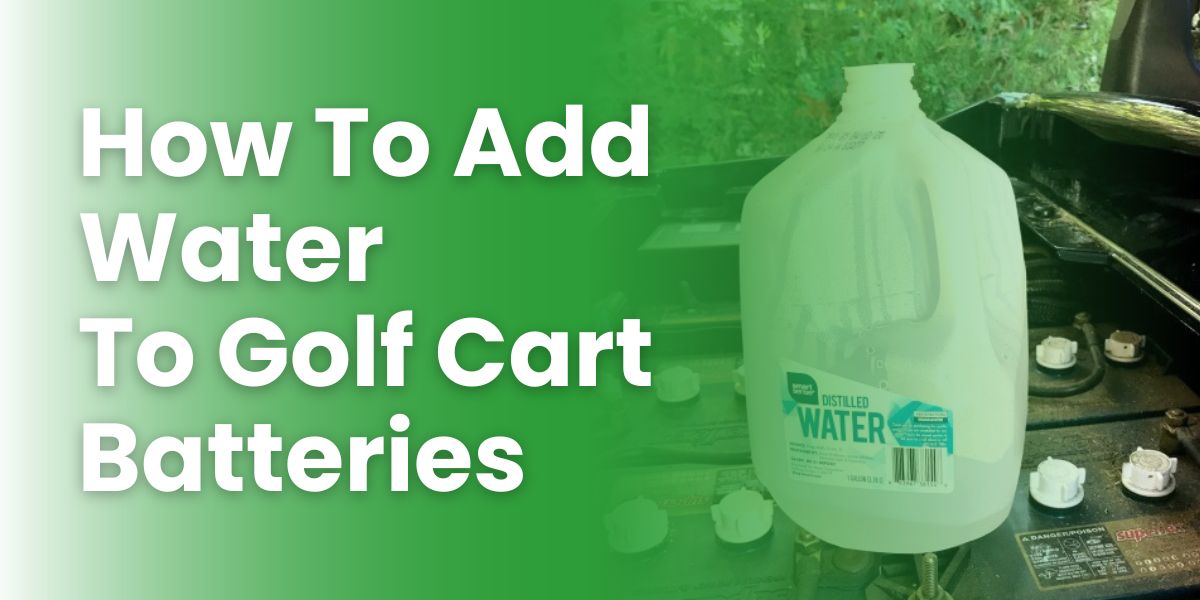When it comes to golf cart battery cable sizes, understanding their importance is key to ensuring optimal performance on the green. The cable size, also referred to as the wire gauge, directly affects the flow of electricity from the battery to the cart’s electrical components, such as the motor and lights. Choosing the right cable size is crucial to prevent power loss, overheating, and potential damage to the cart’s electrical system.
In this informative guide, we’ll explore the factors to consider when selecting the appropriate golf cart battery wire gauge for your golf cart, helping you make an informed decision that will enhance your cart’s performance and longevity. Let’s dive in and tee off on this electrifying topic!
What Is A Golf Cart Battery Cable Size?
Golf cart battery cable size refers to the thickness or diameter of the cables used in connecting the batteries of a golf cart. The battery cable size is vital as it influences the efficiency and safety of electrical flow. Typically measured in American Wire Gauge (AWG), the wire size for golf cart batteries commonly falls into the 6 AWG range. Using the appropriate golf cart battery cables ensures optimal performance, preventing issues like overheating while maintaining safety.
Why Does Wire Size Matters For Golf Carts?
The wire size in a golf cart is more than just a technical specification; it’s central to the cart’s performance and safety. The thickness of these wires, measured by the American Wire Gauge (AWG) system, dictates their ability to carry electrical current. If too thin, they can overheat due to electrical resistance, risking damage or even fire hazards.
Over long distances, an inappropriate wire size can also lead to a voltage drop, compromising the efficiency of the cart’s operation. Furthermore, while thicker wires might seem like a safer bet, they come with added costs. In essence, when wiring a golf cart battery, it’s imperative to consider the appropriate wire size as it directly impacts both safety and efficiency.
What Is The Best Golf Cart Battery Cable Size?
The best-size battery cable for a golf cart is 6 AWG. Using the American Wire Gauge (AWG) system, a lower number signifies a thicker wire. So, 6 AWG is considerably thicker than 18 AWG.
| Golf Cart Voltage | Voltage Recommended Battery Cable Size | Notes & Recommendations |
| 6V | 8 gauge | Suitable for small, personal vehicles or very basic golf carts. |
| 12V | 8 gauge | Commonly found in small personal carts or some utility vehicles. |
| 36V | 6 gauge | It’s common for many older golf carts. You can select 4 gauge wire if you have more accessories or need extra power. |
| 48V | 5 gauge | You can use it for standard golf carts. You can use a 2 gauge cable for better performance. |
| 72V | 2 gauge | It’s suitable for For high-performance carts. Ideally, a 1/0 gauge can be used in cases of extreme modifications or prolonged high-load scenarios. |
How To Choose The Right Golf Cart Battery Cable Size?

Selecting the appropriate golf cart battery cable size is crucial for both performance and safety. The choice is primarily influenced by several factors.
The voltage of the Cart: The cart’s voltage typically determines the initial wire size recommendation. For instance, a 48V cart might require a different cable size compared to a 36V one.
Power Demand and Add-Ons: If your golf cart has added features or modifications, the demand on the battery can be higher, necessitating a thicker wire size to handle the increased current.
Duration of Use: Extended periods of continuous use can place more stress on the cables. Ensuring the correct cable size can prevent overheating and other related issues.
Environmental Factors: Extreme temperatures, whether hot or cold, can affect battery performance and, in turn, the optimal golf cart battery cable size.
Safety and Efficiency: The right cable size ensures efficient power transfer and minimizes risks like cable overheating.
Does Battery Cable Size Affect Performance In Golf Carts?
The battery cable size in a golf cart plays a pivotal role in its performance. A thinner cable might limit the current flow, hindering the cart’s power and efficiency. On the contrary, a thicker cable facilitates better current flow, maximizing the cart’s potential speed and efficiency. For optimal golf cart performance, it’s advisable to choose a cable with a larger diameter.
Wrapping Up
Selecting the right golf cart battery cable size is essential for optimal performance. The correct cable size ensures efficient current flow, maximizing speed and overall efficiency. Always prioritize larger diameter cables to harness the full potential of your golf cart and ensure its longevity. Proper selection not only enhances performance but also promotes safety and durability.
Frequently Asked Questions
Q1: What happens if a golf cart battery cable is too small?
Ans: Inadequate cable size can result in power loss, voltage drop, and potential overheating, affecting the cart’s performance and risking electrical hazards.
Q2: What happens if a golf cart battery is too big?
Ans: Using oversized cables won’t harm the cart but might be unnecessary and costlier. Proper cable size ensures optimal power delivery.
Q3: How do you find out what wire size you have on your golf cart?
Ans: Check your golf cart’s manual or inspect the wires themselves; the wire’s gauge (AWG) is typically printed on the cable insulation.
Q4: What gauge wire do I need for a battery?
Ans: The wire gauge depends on the battery voltage and current demand. For general use, 4 to 6 AWG is common for golf carts.
Q5: What gauge wire do I need for a 12-volt battery?
Ans: A 12-volt battery often requires 6 AWG wire for most golf cart applications.
Q6: How thick should the battery wire be?
Ans: Cable thickness, indicated by wire gauge (AWG), varies with factors like voltage, current, and length. Proper sizing prevents inefficiencies and hazards.





